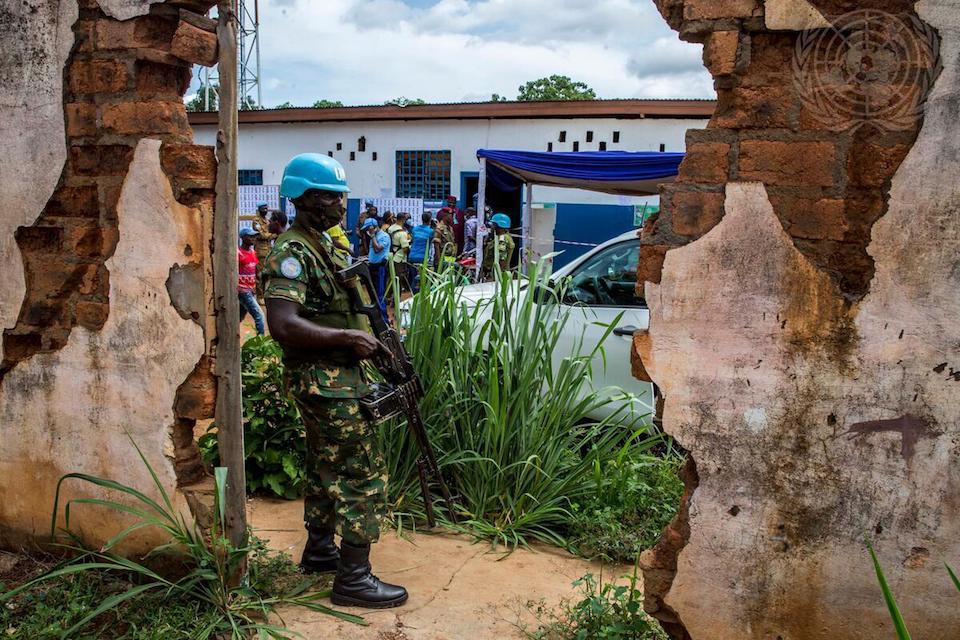Addressing the fragile security and political situation in the Central African Republic
Statement by Ambassador James Roscoe, UK Acting Deputy Permanent Representative to the UN, at the Security Council briefing on MINUSCA

Thank you, Mr President. [I would like to begin by thanking Special Representative Ndiaye for your briefing today, and for your work in particularly challenging circumstances. Through you, I would ask you to pass on our deepest thanks to the women and men of MINUSCA. I also thank President Lourenço for his contribution to the discussion this morning and for the perspective he brings from the region through his delegation. We are also grateful to the other briefers.
Mr President, it’s clear from the briefings that we’ve heard this morning, and from the reporting, that the Central African Republic today faces a series of complex challenges. A fragile security and political environment. Armed groups fomenting instability, frankly, in order to line their own pockets. Enormous unmet humanitarian needs. And now, a new factor of instability: Russian private military companies acting in concert with the national armed forces to obstruct MINUSCA and to violate the rights of the civilians and citizens of the Central African Republic.
In the face of all of this, the United Kingdom commends the continued resilience and courage of the people of the Central African Republic, and of the women and men of MINUSCA who continue to put their lives at risk to protect civilians. I want to underline, as others have this morning, our utmost concern at the significant increase in Status of Forces Agreement (SOFA) violations against MINUSCA. These are unacceptable and they must stop immediately.
The United Kingdom is also deeply troubled to hear further reports of violations of international humanitarian law, and of human rights violations and abuses, including acts of sexual violence. We know these are being committed not only by armed groups - something we have, sadly, come to expect - but also by members of the national armed forces and the Russian private military personnel accompanying them.
Now, I know my Russian colleague, in her statement, will deny this, but the evidence is increasing and overwhelming, and I hope they will reflect on the role they want to play in the Central African Republic and their responsibilities as a permanent member of this Council. And I join France and others in calling on MINUSCA for clarity on the status of Russian private military personnel and for more granular reporting on the question of violations, and on who is committing those violations.
We are encouraged, Mr President, by President Touadera’s commitment to address impunity. But we now urge the government to take concrete steps to investigate all allegations and to take preventive action. Justice and accountability is a fundamental building block of any viable path towards stability and development.
At the same time, we express our concern over further allegations of sexual exploitation and abuse by some MINUSCA personnel, and urge all contributing countries to swiftly address such allegations in line with the UN’s zero-tolerance policy.
Mr President, we are extremely worried by the further deterioration in the humanitarian situation over the course of the last six months; as we’ve heard, an estimated 2.8 million people are now in need of protection and assistance. We urgently call on all actors to respect the principles of humanitarian access, including the protection of humanitarian workers, in line with Security Council Resolution 2417. And as Deputy SRSG Brown is here, I want to thank her directly for her own personal efforts and the risks she has taken in this regard.
It is now imperative that all political actors, including government, armed groups and opposition move ahead with constructive and inclusive national dialogue. This is essential to deliver stability and development to the people of the Central African Republic.
And we’ve heard today from our briefers and from others what needs to be done to make progress. So we continue to support the engagement of the peace agreement co-guarantors and other regional actors in bolstering these efforts, and we welcome the joint visit of the African Union, ECCAS, the EU and the UN. Above all, however, we look to the Central African authorities to live up to their responsibilities, to find a sustainable exit from the current crisis, and to advance an inclusive settlement. This is the only route to a lasting peace.
Finally, if I may, Mr President, as others, including President Lourenço, have raised the issue of the arms embargo, let me briefly set out our view, which chimes with that of others. In light of the volatile situation, we believe it is important to maintain the arms embargo as it stands, pending further progress on the key benchmarks set out by this Council in April 2019, in particular regarding weapons management. We agree the time may come to act to increase the Central African Republic’s defensive capabilities, but that time is not now.
Thank you, Mr President.